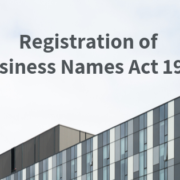Board Meetings and Minute Taking – What needs to be done?
Section 160-166 of the Companies Act 2014 (“the Act”) governs both board meetings and committee meetings by laying down guidelines, that can be amended or omitted from a company’s constitution and mandatory provisions, that must be adhered to. For the purpose of this article, board meetings will be the main point of discussion.
Every director is entitled to reasonable notice of the meeting, a meeting can be called by a director alone or by a company secretary at the requisition of a director. The quorum necessary for the transaction of business is fixed as 2 directors. However, where there is a sole director, one director is accepted to meet the requirements of a quorum. A Chairperson of a board meeting can be fixed for a specific period. However if the chosen Chairperson is not present and a period of 15 minutes has elapsed, the directors may choose one of their own to chair the meeting. The majority of votes may pass a resolution. If there is an equal vote, the Chairperson shall be the casting vote.
Section 161 provides for the option to pass a written resolution signed by all the relevant directors (i.e. directors who are entitled to notice of the meeting) in lieu of a board meeting. This has the same effect as physically holding the board meeting with the directors. This section also stipulates the manner in which a board meeting can be held and extends the scope of what it means to attend a board meeting through electronic communication. The section also provides a guide for the location of the board meetings, subject to the company’s constitution:
- Where the largest group of those participating are assembled
- If no such group exists, the next suitable location is the where the chairperson is
- If neither of the above apply, then it falls to any such place that the meeting decides
The Act also covers the requirements for minute taking of the board minutes in section 166. The accurate and efficient recording, drafting and maintenance of minute taking is imperative to ensure administrative compliance. Section 166(1) states that minutes must be maintained for the following purposes:
- All appointments of officers made by directors
- The names of all the directors present at each meeting of its directors
- All resolutions and proceedings at all meetings of its directors
Typically the Chairperson, once approved by the board, signs the minutes at the following board meeting. The board minutes can also be subject to inspection by the Director of Corporate Enforcement. If a company fails to comply with the Director of Corporate Enforcement regarding the request of the company’s minutes, the company and any officer in default shall be guilty of a category 4 offence, i.e. a fine not exceeding €5,000.
For further information, please contact Emma Dunne, Manager of our Corporate Compliance Department.









